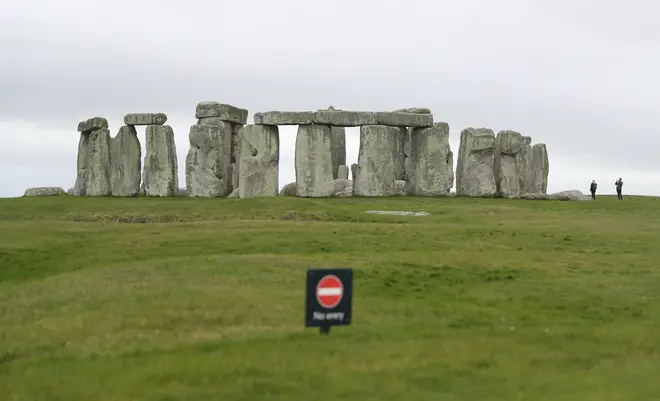
Nick Abbot 10pm - 1am
12 November 2020, 13:38 | Updated: 12 November 2020, 17:36

Transport Secretary Grant Shapps has given his consent for a controversial road project which will see a tunnel built near Stonehenge in Wiltshire.
The decision, announced by Transport Minister Andrew Stephenson, goes against the recommendations of planning officials, who warned it would cause "permanent, irreversible harm" to the World Heritage Site.
The A303, which is a popular route for motorists travelling to and from the South West, is often severely congested on the single carriageway stretch near the stones in Wiltshire.
Read more: Queen's 2022 Platinum Jubilee to be marked with four-day Bank Holiday weekend
Read more: Economy bounces back 15.5% after spring coronavirus lockdown
Highways England says its plan for a two-mile tunnel near the existing road will remove the sight and sound of traffic passing the site and cut journey times.
But environmentalists and archaeologists have voiced their opposition to the plan due to its potential impact on the area.
BREAKING @grantshapps gives go ahead for #StonehengeTunnel. The Stonehenge Alliance deeply regrets a decision that will send shock messages around the world. It will breach UK’s international treaty obligation not to damage the WHS. Full statement here: https://t.co/pIXkZZmJqk pic.twitter.com/F5fyPAwXsF
— Stonehenge Alliance (@SaveStonehenge) November 12, 2020
In June it emerged that a team of archaeologists had discovered a ring of at least 20 large shafts within the World Heritage Site, a short distance from the stones.
The project is classified as nationally significant, which means a Development Consent Order is needed for it to go ahead.
The Planning Inspectorate - an executive agency of the Ministry of Housing, Communities and Local Government - recommended the Transport Secretary withhold consent because the project would substantially and permanently harm the integrity and authenticity of the World Heritage Site, which includes the stone circle and the wider archaeology-rich landscape.
Professor David Jacques of the University of Buckingham, who has been working since 2005 on the Blick Mead area within the world heritage site, close to where the road will run, said the decision was "gut-wrenching".
He said investigations at Blick Mead had revealed thousands of years of Mesolithic occupation, ancient plant DNA which provides a record of the landscape, and well preserved aurochs' hoofprints.
"The tunnel is going to clearly compromise the archaeology. Whose interest is that in? It makes no sense," he said.
Why did the Planning Inspectorate recommend tthe Government should turn down the #StonehengeTunnel?
— Tom Holland (@holland_tom) November 12, 2020
Because it threatens "substantial harm" to the Stonehenge landscape, which is - as the Planning Inspectorate reminds the Government - a World Heritage Site https://t.co/mHeZRoBWiK
"It's not just about Stonehenge, it's not just about Britain, it's an international scandal."
He said the move to breach an international treaty, the World Heritage Convention, must have been done with the approval of Prime Minister Boris Johnson, and said "he should hang his head in shame".
"Stonehenge is precious for the whole of humanity, for our understanding of how we have adapted and evolved as a species since the Ice Age," he said.
In a report to Mr Shapps, the officials said permanent, irreversible harm, critical to the outstanding universal value of the site, or why it is internationally important, would occur, "affecting not only our own, but future generations".
The Department for Transport wrote to Highways England stating that: "The Secretary of State is satisfied that, on balance, the need case for the development together with the other benefits identified outweigh any harm."
Highways England chief executive Jim O'Sullivan said: "This transformational scheme will return the Stonehenge landscape towards its original setting and will improve journey times for everyone who travels to and from the South West."
Project director Derek Parody said: "It is a scheme objective to conserve and enhance the World Heritage Site and this is being achieved through close collaborative working with heritage groups, including English Heritage, National Trust, Historic England and the independent A303 Scientific Committee."
Preparatory work is due to begin in spring next year, with the five-year construction phase expected to start by 2023.
This means the tunnel is likely to open one year later than initially planned.
Chancellor Rishi Sunak announced in March that funding is in place for the project, which is part of a £1.7 billion upgrade of the A303.
Public-private funding was due to be used to finance the work, but in October 2018 then-chancellor Philip Hammond cancelled future deals using that model.
The Planning Inspectorate’s Chief Executive, Sarah Richards said: “There has been a great deal of public interest in this project.
"A major priority for us over the course of the examination was to ensure that communities who might be affected by this proposal had the opportunity to put forward their views.
"As always, the Examining Authority gave careful consideration to these before reaching its conclusion.”